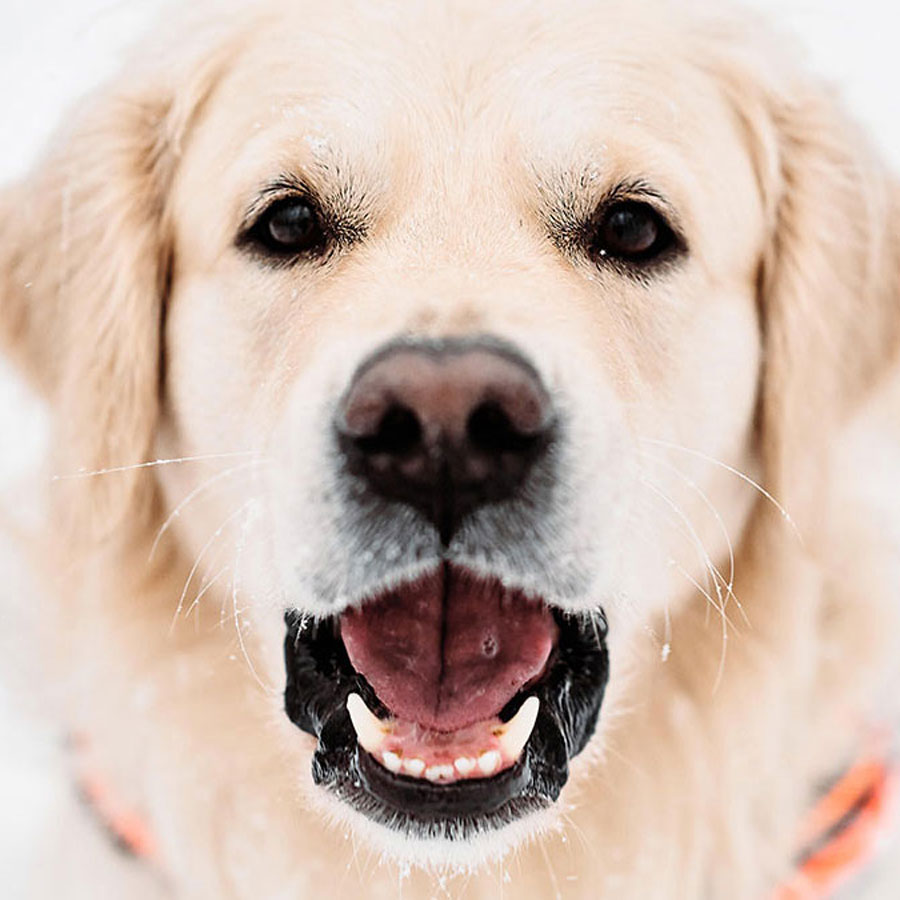An aggressive golden retriever sounds like a paradox because this breed is famous for its friendly temperament.
However, a dog’s temperament depends on more factors than its genetics, so some golden retrievers may exhibit behavior unnatural for the breed.
Some dogs are only aggressive occasionally, in particular situations, whereas others may express aggression non-stop. The degree of its expression also varies.
Aggression in dogs can be inherited, caused by poor training or neglect, or develop suddenly without an apparent reason.
In each of these scenarios, aggression shouldn’t be ignored. Aggression in golden retrievers is a worrying sign that requires investigation and behavioral therapy.
In most cases, aggressive dogs learn to behave well when the trigger is eliminated.
Is It Normal For a Golden Retriever To Be Aggressive?
Golden retrievers are known to be friendly, sociable dogs that are gentle with kids and get along well with other animals. Most golden retrievers happily let strangers pet them, waving their tails and showing a wide smile.
However, aggression is a natural response to triggers in dogs, and golden retrievers have the same instincts as other canines. Whether aggression is normal depends on the circumstances.
Many dogs display aggression towards unfamiliar people during the first interaction. It occurs either because of fear, protecting the owner, or due to a lack of socialization.
Some dogs express aggression when someone attempts to touch their possessions or enters their territory.
Redirected aggression occurs when something triggers a dog, but it can’t attack the target. If someone approaches the dog while it’s aroused, it may be aggressive towards a person or animal who didn’t do anything wrong.
Dogs often become aggressive to assert dominance, particularly during the mating period. Lastly, aggressive behavior can result from pain.
Aggression is natural in each of these cases, but its degree should be adequate. Aggression towards family members and familiar people is never normal, and owners should identify the root of such behavior.
Although aggression towards strangers and other animals is widespread in dogs, it should be discouraged. With proper training, owners can teach any dog to behave well.
What Does Aggression in Golden Retrievers Look Like?
To distinguish between actual aggression and other behavioral issues, you should know what aggression in golden retrievers looks like. Inexperienced owners often confuse anxiety, fear, and even excitement with aggression.
The first signs of aggression in dogs that come to mind are growling and biting, but there are many less apparent signals. An aggressive dog may expose its upper teeth, have its ears pinned back, snarl, and have a stiff posture.
According to American Kennel Club, an aggressive dog typically displays the signs of direct aggression along with symptoms of anxiety or arousal, which may indicate the aggression cause.
The signs of anxiety in dogs include yawning, lip licking, panting, sniffing, and tucking the tail under the body. If a dog keeps its ears forward or leans forward with its entire body and slowly wags its tail, it’s aroused.
How to act when a dog is aggressive depends on the aggression cause. The universal tip is removing the trigger from the dog’s sight.
Lack of Socialization
A lack of socialization is the most common cause of aggression in golden retrievers. Suppose a golden retriever puppy was never exposed to unfamiliar environments, met people other than the breeder, or played with other dogs.
In that case, it will become anxious and scared of social interactions. Some dogs exhibit aggression when scared, so the only way to deal with aggression caused by a lack of socialization is to work with the dog’s fears.
Good golden retriever breeders put a lot of effort into socializing their dogs, inviting guests over to get the puppies accustomed to people, and attending group training sessions or walking in public parks.
When choosing a puppy, ensure that it doesn’t grow sheltered and isn’t overly shy when you approach it. If you already have an under-socialized dog, seek a professional behavioral specialist’s help.
Abuse
If a golden retriever is aggressive towards a specific gender, age, or another category of people, its reaction may result from a history of abuse.
Under-socialized dogs are typically aggressive towards all strangers. There’s usually a valid reason for a dog despising a particular category of people.
Signs of physical abuse may be apparent, but emotional abuse may go undetected for a while. Still, abuse always takes its toll, affecting the dog’s behavior.
Unfortunately, not only rescue dogs may have a history of abuse. One may think that registered golden retriever breeders would take proper care of their dogs, but this isn’t true for every breeder.
Some people use harsh punishment when training puppies, which leads to anxiety and fear. In that case, a dog may also dislike specific sounds, objects, or actions.
Dealing with dog aggression caused by abuse requires patience. Every mistake takes the dog two steps back, further hindering the behavioral therapy.
The owner should only use positive reinforcement when training the dog and reduce exposure to triggers.
Mental Disorders
If a golden retriever suddenly starts acting aggressively despite generally being a well-behaved dog, it may have a mental disorder. In this scenario, owners may notice other abnormalities in the dog’s behavior and habits.
Rage syndrome, a rare form of dominance aggression in dogs, is caused by seizures that trigger defensive and predatory responses. Aggression caused by rage syndrome is uncontrollable and occurs for no reason.
Sometimes, rage syndrome is caused by trauma, brain tumor, or stroke, but it’s usually inherited. Another condition that may cause aggression is a cognitive dysfunction disorder, the equivalent of human dementia.
This disorder can manifest differently. Some dogs stop recognizing their owners and behave aggressively, thinking they’re strangers, or become anxious because of loud noises.
Pain
If a golden retriever is aggressive for no reason (no apparent reason, to be precise), it may experience physical pain. Pain-elicited aggression in dogs occurs because they don’t want anyone to touch the affected area.
So, you can determine that your dog is in pain by noting when it displays aggression.
If your dog starts growling or barking when you attempt to touch a particular body part, it may have a trauma or a condition causing internal pain.
Other signs of a dog in pain include reluctance to eat and play, excessive vocalization, changes in gait if the pain is caused by trauma, and licking the affected area.
Naturally, the first step in dealing with pain aggression in golden retrievers is bringing the dog to a vet to determine the cause of such behavior. When the pain fades away, the dog should get back to normal.
Mating Aggression
Sometimes, owners of intact dogs have to deal with mating aggression. Such aggression is widespread among female dogs in heat and male dogs competing for a female’s attention.
Mating aggression in female dogs is caused by hormonal changes. Some dogs are affected more than others, and the best way to deal with unwanted behavior, in this case, is to spay the dog.
Female dogs may also be aggressive when protecting their puppies, even if they’ve never expressed aggression previously. If your dog has puppies, be careful when handling them and comfort your dog to show you don’t mean them any harm.
If you have two male dogs fighting for a female, the only way to prevent aggression is by neutering them or separating them. Alternatively, you may consult a vet regarding calming medication.
Fear
If a golden retriever becomes aggressive when exposed to particular situations, it may be scared. Evaluate your dog’s body language to distinguish between aggression caused by fear and aggression triggered by other reasons.
Aggression is offensive if the dog moves closer to the target. In contrast, if a dog expressing aggression moves back from the threat, it behaves defensively. It may crawl, hide behind objects, or press its tail between its legs.
Note that manifestation of fear aggression in dogs can become more offensive throughout the lifetime if not dealt with timely.
Dogs commonly fear loud noises, injections, other veterinary manipulations, strangers, and other dogs. The best course of action, in this case, is to seek the help of a canine behavior specialist.
Irresponsible Breeding
Friendliness, confidence, and affection in golden retrievers are inherited. These dogs are less likely to display aggression than other dogs because they were bred this way.
Responsible breeders only pick dogs with the correct temperament for their breeding program.
Unfortunately, some people only breed dogs for the money and don’t care about their temperament. If a golden retriever is naturally aggressive, its descendants are more likely to have behavioral problems.
Inherited aggression is also more likely in mixed-breed dogs than in purebred golden retrievers.
Being aggressive towards strangers and other dogs can be considered a norm for a mix of golden retriever and Doberman pincher, German shepherd, or rottweiler.
Naturally, genetics is only one factor determining a dog’s behavior, so owners of dogs that were born aggressive shouldn’t give up on their training.
Sources
- www.pupvine.com/are-golden-retrievers-aggressive/
- petkeen.com/can-golden-retrievers-be-aggressive/
- www.ancillaryk9.com/10-signs-your-dog-has-aggression-issues/
- www.akc.org/expert-advice/training/reactivity-vs-aggression/
- vcahospitals.com/know-your-pet/fear-vs-aggression
- www.dvm360.com/view/dog-aggression-toward-owner-can-be-due-to-genetic-predisposition
- www.akc.org/expert-advice/training/common-fears-and-phobias-in-dogs/
- www.petmd.com/dog/conditions/behavioral/c_dg_AggressionInterdog
- www.cesarsway.com/heat-and-aggression/
- petkeen.com/pain-elicited-dog-aggression/


